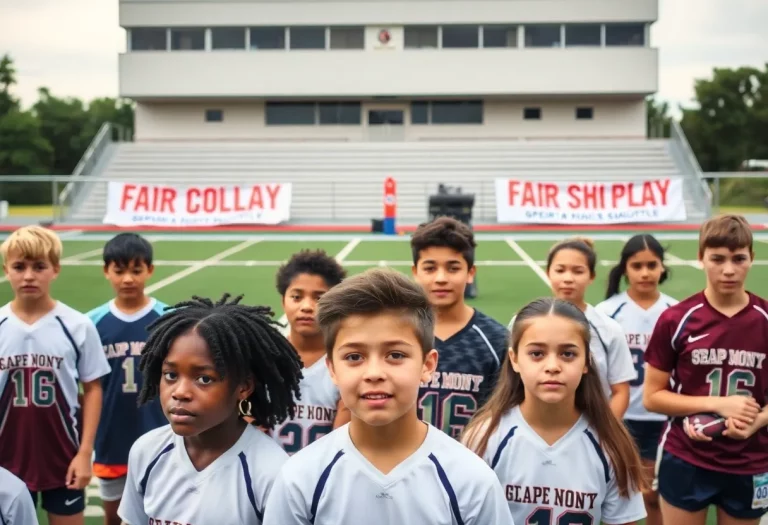News Summary
A group of high school athletes in Oregon has filed a federal lawsuit to prohibit transgender athletes from competing in girls’ sports. The plaintiffs argue that their opportunities for championships are compromised. As the legal challenge unfolds, discussions about fairness and inclusion in sports intensify across the state, potentially affecting broader national policies on gender identity in athletics.
Oregon High School Athletes Stand Up in Court for Fair Play
In a bold move this week, a group of high school athletes from Oregon has decided to take a stand for what they believe is fair play in sports. These young sportswomen have filed a federal lawsuit aiming to ban transgender athletes from competing in girls’ sports and to overturn records set by those competitors. The lawsuit has stirred up a lot of conversation and varying opinions across the state.
Who are the Plaintiffs?
The lawsuit has three main athletes at its heart: S.C., S.N.C., and Madelyn Eischen, an 18-year-old graduate. All three have cited experiences where they felt disadvantaged by competing against transgender athletes. S.C. recently felt the strain during the 2024 state track and field championships, where her performance in both the girls’ 200-meter and 400-meter dash landed her in third place, while transgender athletes took the top spots. In a similar vein, S.N.C. withdrew from a competition when she learned she’d be up against a transgender athlete, claiming the situation impacted her chances for collegiate opportunities.
The Human Side of the Lawsuit
This case isn’t just about records and wins; it’s about the personal stories behind the athletes. Eischen also made the decision to withdraw from a high jump event, expressing concerns over fairness when competing against a transgender athlete. Each of them feels their dreams of sports recognition and scholarships are on the line, stating that competing against transgender athletes has led to losses in rankings and, subsequently, opportunities. They believe these changes violate Title IX, which aims to protect against sex discrimination in educational environments.
The Legal Landscape
The lawsuit was filed in U.S. District Court and lists several defendants, including Oregon’s Governor, the Oregon Department of Education, and various school districts across the state. The athletes are not only aiming for a ban on future participation by transgender athletes but also seek to erase records set by them. They argue that the inclusion of transgender competitors presents unfair competition, diluting their own chances at victory.
The Bigger Picture
This lawsuit fits into a broader national trend. Across the United States, similar cases are popping up as communities grapple with the implications of transgender participation in sports. It’s a contentious debate balancing inclusion against the perceived fairness of competition. Significantly, the ruling could influence a variety of situations across different states.
What’s at Stake for Oregon?
Oregon, known for its progressive policies, has stayed firm on its inclusion guidelines, compelling schools to allow students to compete based on their gender identity. With around $1.8 billion in federal education funds at stake, this situation is also layered with political nuance, particularly in light of previous executive orders regarding funding related to transgender athletes. The plaintiffs claim that the current policies create emotional distress for female athletes, fundamentally raising the stakes for sports departments and educational institutions in the state.
Reactions from Schools and Authorities
Responses from school districts so far have been rather muted. For instance, Newberg-Dundee Public Schools have acknowledged their intention to comply with state laws while prioritizing the safety and respect of all students. However, the tension surrounding the issue is palpable, with those on both sides of the argument sharing their perspectives on social platforms and at community meetings.
What Comes Next?
The trio of athletes and their parents, supported by the America First Policy Institute, are pursuing this lawsuit not only for their own interests but as part of what they view as a broader need for fairness and equality in girls’ sports. The athletes are keenly aware of the risks involved but feel compelled to make a stand. As we wait to see how this legal challenge unfolds, the sports community in Oregon and beyond remains engaged in discussions about the future of competition and inclusion in sports.
As this situation develops, it’s certain that it will continue to spark debates about gender, fairness, and the rights of all athletes to compete. The outcome will undoubtedly have a significant impact, not only within Oregon but also as a benchmark for policies across the nation.
Deeper Dive: News & Info About This Topic
LIVE BALL Resources
Hispanic Student-Athlete Alleges Discrimination in Idaho
High School Sports Achievements Shine Bright in 2024-25 Season
Controversy and Triumph at Minnesota High School Track Meet
Champlin Park High School Wins State Softball Championship
Portland Athletes Compete in State Golf and Tennis Championships
Southern California High Schools Oppose Transgender Athletes
Minneapolis Softball Star Marissa Rothenberger Shines on the Field
Controversy Surrounds Transgender Athlete Participation in Minnesota
Talent Shines at Oregon High School Track and Field
Oregon High School Track and Field Stars Shine This Season
Additional Resources
- OregonLive
- Dictionary: Transgender
- Portland Tribune
- Google Search: Title IX Lawsuit
- Willamette Week
- Encyclopedia Britannica: Title IX
- KATV
- Wikipedia: Transgender People in Sports
- HuffPost
- Google Scholar: Transgender Athletes Lawsuit


